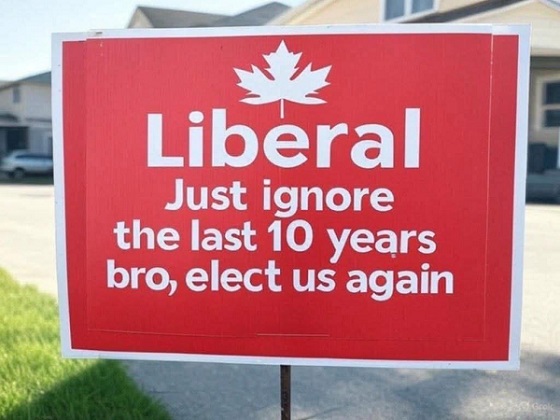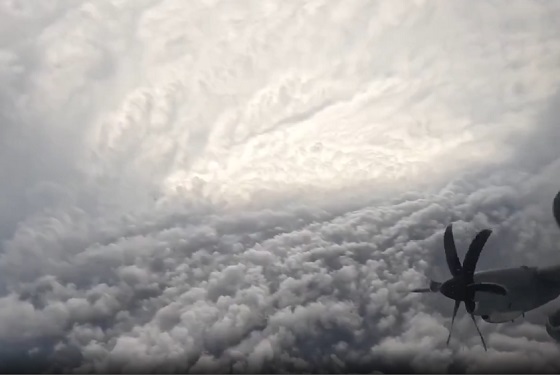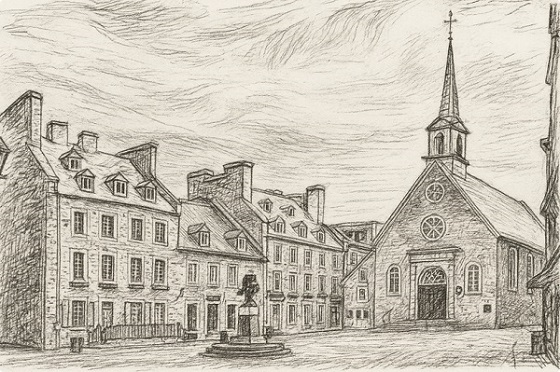2025 Federal Election
Will Four More Years Of Liberals Prove The West’s Tipping Point?

The 1997 political comedy Wag The Dog featured a ruling president far behind in the polls engaging Hollywood to rescue his failing ratings. By inventing a fake war against Albania and a left-behind “hero”— nicknamed Shoe— the Hollywood producer creates a narrative that sweeps the nation.
The meme of hanging old shoes from the branches of trees and power lines catches on and re-elects the president. In a plot kicker, the vain producer is killed by the president’s handlers when he refuses to stay quiet about his handiwork. The movie’s cynicism over political spin made it a big hit in the Bill Clinton/ Monica Lewinsky days.

In the recent 2024 election the Democrats thought they’d resurrect the WTD formula to spin off senile Joe Biden at the last minute in favour of Kamala Harris. Americans saw through the obvious charade and installed Donald Trump instead.
You’d think that would be enough to dissuade Canadians who pride themselves on their hip, postmodern humour. But you’d be wrong, they don’t get the joke. Wag The Carney is the current political theatre as Liberals bury the reviled Justin Trudeau and pivot to Mark Carney. If you believe the polling it might just be working on a public besotted by ex-pat Mike Myers and “Canada’s Not For Sale”.
As opposed to Wag The Dog, few are laughing about this performative theatre, however. There are still two debates (English/ French) and over three more weeks of campaign where anything— hello Paul Chiang—can happen. But with Laurentian media bribed by the Libs— Carney is threatening those who stray— people are already projecting what another four years of Liberals in office will mean.
As the most prominent outlier to Team Canada’s “we will fight them on the beaches…” Alberta’s premier Danielle Smith is already steering a course for her province that doesn’t include going to war with America on energy. She asked Trump to delay his tariffs until Canadians had a chance to speak on the subject in an election April 28. Naturally the howler monkeys of the Left accused her of treason. She got her wish Wednesday when Canada was spared any new tariffs for the time being.

Clearly, she (and Saskatchewan premier Scott Moe) have no illusions about Carney not using their energy industry as a whipping post for his EU climate schemes. They’ve seen the cynical flip in polls as former Trudeau loyalists hurry back to the same Liberal party they abandoned in 2024. They know Carney can manipulate the Boomer demographic just as he did when he called for draconian financial methods against the peaceful Truckers Convoy in 2022.
Former Reform leader Preston Manning is unequivocal: “’Large numbers of Westerners simply will not stand for another four years of Liberal government, no matter who leads it.’“ So how does the West respond within Confederation to protect itself from a predatory Ottawa elite?
Clearly, the emissions cap— part of Carney’s radical environmental plans— will keep Alberta’s treasure in the ground. With Carney repeating no cancellation of Bill C-69 that precludes building pipelines in the future, the momentum for a referendum in Alberta will only grow. The NDP will howl, but there will be enough push among from the rest of Albertans for a new approach within Canada.
In this vein Smith even wants to approach Quebec. While it seems like odd bedfellows the two provinces most at odds with the status quo have much in common . “This is an area where our two provinces may be able to coordinate an approach,” Smith wrote this week. That could include referendums by the middle of 2026.
Perhaps the best recipe for keeping the increasingly fractious union together is a devolution of power, not unlike that governing the United Kingdom. While Westminster remains the central power since 1997, there are now separate parliaments in Scotland, Wales and Northern Ireland that put power closer to the citizen, so that local factors are better recognized in decision making.
With so little uniting the regions of the country any longer, devolution might provide a solution. What form could decentralization take within Canada? A Western Canada Parliament could blunt predatory federal energy policies while countering the imbalances of Canada’s equalization process. Similar parliaments representing Quebec, the Atlantic provinces, Ontario and B.C. would protect their own special interests within Canada. Ottawa could handle Canada’s international obligations to defence, trade and international cooperation.
While the idea is fraught with pitfalls it nonetheless remains preferable to a breakup of the nation, which four more years of Liberals rule under Mark Carney and the same Trudeau characters will likely precipitate. Smith’s outreach case would be the beginning of such a process.
None of this would be necessary were the populations of Eastern Canada and B.C.’s lower mainland remotely serious after snoozing through the Trudeau decade. The OECD shows Canada’s 1.4% GDP barely ahead of Luxembourg and behind the rest of the industrialized world from 2015-2025. As we’ve said before the Boomers sitting on their $1 million-plus homes are re-staging Woodstock on the Canada Pension and OAS. As with Wag The Dog, they’re not getting the joke.

When the Boomers award themselves another four years of taxapalooza and Mike Myers and the other “Canada Not For For Sale” celebs head south to their tax-avoidance schemes how will the Boomers say they’ve left Canada better off for anyone under 60? We’ll hang up and listen to your answer on the TV.
Bruce Dowbiggin @dowbboy is the editor of Not The Public Broadcaster A two-time winner of the Gemini Award as Canada’s top television sports broadcaster, his new book Deal With It: The Trades That Stunned The NHL And Changed hockey is now available on Amazon. Inexact Science: The Six Most Compelling Draft Years In NHL History, his previous book with his son Evan, was voted the seventh-best professional hockey book of all time by bookauthority.org . His 2004 book Money Players was voted sixth best on the same list, and is available via brucedowbigginbooks.ca.
2025 Federal Election
Protestor Behind ‘Longest Ballot’ Chaos targeting Poilievre pontificates to Commons Committee

Lawmakers confront organizer Tomas Szuchewycz for flooding ridings with placeholder candidates, targeting Pierre Poilievre’s seat, and wasting public resources.
Szuchewycz’s most notorious move came in Carleton — the riding of Conservative Leader Pierre Poilievre, where the ballot swelled to 91 names, stretching nearly a metre and forcing Elections Canada to redesign how it printed and handled the vote. The LBC framed the stunt as a protest against Canada’s first-past-the-post electoral system. But to most voters, it looked nothing like a principled reform campaign. What they saw was an effort aimed squarely at Poilievre, meant to bury his name among a wall of nobodies and turn the vote into a farce.
Elections Canada had to scramble to manage the chaos: printing extra‑long ballots, re‑training workers, and creating a last‑minute write‑in workaround in Battle River–Crowfoot to keep ballots usable. Seniors and disabled voters complained about the physical size and complexity of the ballot; poll workers faced new logistical headaches; public money was wasted.
At Tuesday’s hearing, Szuchewycz showed no contrition and offered no practical alternative to the system he had tried to upend. Instead, he accused MPs of having a “conflict of interest” in writing election law and demanded that power be handed to an undefined “permanent, non‑partisan body” — without explaining who would select it, how it would operate, or how it would be accountable to Canadians.
The LBC, whose actions led to metre-long ballots in ridings like Carleton (91 candidates) and Battle River–Crowfoot (86), claims to oppose Canada’s first-past-the-post system. But when asked how his proposed independent reform body would be formed, selected, or held accountable, Szuchewycz had no answers.
Conservative MP Michael Cooper led the charge, accusing Szuchewycz of overseeing a signature-harvesting scheme that involved electors signing blank nomination forms—potentially in violation of the Canada Elections Act. He tabled a January 2024 tweet and an August 2024 YouTube video showing organizers gathering signatures under the claim that candidate names would be “filled in later.”
Szuchewycz denied the accusation, claiming nomination papers had either candidate names or the phrase “all candidates” filled in. But when he tried to discredit Cooper’s evidence by calling it “AI-generated,” the committee chair issued a warning for casting doubt on the authenticity of a Member’s documents without basis. The comment was withdrawn under pressure.
Still, Cooper was unsatisfied, warning Szuchewycz that misleading Parliament could amount to contempt.
Other witnesses—experts and former elected officials—were equally critical of the LBC’s tactics. Dr. Lori Turnbull, a professor at Dalhousie University, called the stunt “undesirable” and a “waste of resources,” though she praised Elections Canada for adapting quickly by allowing a write-in workaround in Battle River–Crowfoot to avoid printing a literal wall of names.
Professor Peter Loewen of Cornell University added that the LBC’s ballot-stuffing “violates the spirit” of competitive democracy and burdens front-line elections staff with unnecessary logistical chaos. He warned that a third-party group acting like a political party without oversight was a loophole that needed closing.
Meanwhile, former Liberal MP Louis-Philippe Sauvé described the real-world toll of the stunt: longer lineups, stressed poll workers, and accessibility hurdles for elderly and visually impaired voters.
In stark contrast to these grounded critiques, Szuchewycz’s testimony revolved around vague accusations of “conflict of interest” by MPs and a call to remove Parliament from electoral reform altogether. No constitutional roadmap. No governance model. No practical enforcement mechanism.
At the end of the day, what Tomas Szuchewycz has done isn’t just a stunt, it’s an insult. He claims Canadians “know what he’s protesting,” but let’s be honest: most voters had no clue this was about electoral reform. What they saw was a campaign to flood ballots with nonsense names in key ridings, especially against the Leader of the Opposition, and create chaos for chaos’s sake.
The takeaway wasn’t a conversation about democracy. It was a spectacle, and one that mocked the very voters he pretends to represent. Lets be clear, This wasn’t activism, it was ego masquerading as principle. And it reeked of entitlement.
Tomas Szuchewycz is the embodiment of unchecked privilege: a man who hijacked our electoral process, wasted taxpayer dollars, and offered nothing in return but smug contempt for the very democracy that gave him the space to pull his stunt.
He claims Canadians understood his message. They didn’t. Most people saw a confusing mess, an attack on the Opposition Leader, and a joke made at the expense of voters, poll workers, and the electoral system itself.
So yes — reform is coming. And it can’t come soon enough.
Parliament must not just close the loopholes it should make sure that when someone deliberately sabotages the integrity of an election, they are held accountable, including being forced to repay the public for the cost of their chaos.
Because in a democracy, you have the right to protest.
But not the right to turn an election into a farce on the public’s dime.
Subscribe to The Opposition with Dan Knight
Invite your friends and earn rewards
2025 Federal Election
Post election report indicates Canadian elections are becoming harder to secure

Chief Electoral Officer Stéphane Perrault highlights strong participation and secure voting, but admits minority politics, rising costs, and administrative pressures are testing the system’s limits.
Monday in Ottawa, Stéphane Perrault, Canada’s Chief Electoral Officer, delivered a long press conference on April’s federal election. It was supposed to be a victory lap, record turnout, record early voting, a secure process. But if you listened closely, you heard something else: an admission that Canada’s election machinery is faltering, stretched thin by a system politicians refuse to fix.
Perrault touted the highest turnout in 30 years, 69 percent of eligible voters, nearly 20 million Canadians. Almost half of those ballots were cast before election day, a dramatic shift in how citizens take part in democracy.
“Twenty years ago, less than 7% voted early. This year, nearly half did,” Perrault told reporters. “Our system may have reached its limit.”
That’s the core problem. The system was built for one decisive day, not weeks of advance voting spread across campuses, long-term care homes, mail-in ballots, and local Elections Canada offices. It’s no longer a single event; it’s an extended process that stretches the capacity of staff, polling locations, and administration.
Perrault admitted bluntly that the 36-day writ period, the time between when an election is called and when the vote happens, may no longer be workable. “If we don’t have a fixed date election, the current time frame does not allow for the kind of service preparations that is required,” he said.
And this is where politics collides with logistics. Canada is once again under a minority government, which means an election can be triggered at almost any moment. A non-confidence vote in the House of Commons, where opposition parties withdraw support from the government, can bring down Parliament in an instant. That’s not a flaw in the system; it’s how parliamentary democracy works. But it leaves Elections Canada on permanent standby, forced to prepare for a snap election without knowing when the writ will drop.
The result? Sixty percent of voter information cards were mailed late this year because Elections Canada couldn’t finalize leases for polling stations on time. Imagine that, more than half the country got their voting information delayed because the system is clogged. And that’s when everything is supposedly working.
The April election cost an estimated $570 million, almost identical to 2021 in today’s dollars. But here’s the kicker: Elections Canada also spent $203 million just to stay ready during three years of minority Parliament. That’s not democracy on the cheap. That’s bureaucracy on retainer.
Perrault admitted as much: “We had a much longer readiness period. That’s the reality of minority governments.”
No Foreign Interference… But Plenty of ‘Misinformation’
Canada’s top election official wanted to make something perfectly clear: “There were no acts of foreign interference targeting the administration of the electoral process.” That’s the line. And it’s a good one… reassuring, simple, the kind of phrase meant to make headlines and calm nerves.
But listen closely to the wording. He didn’t say there was no interference at all. He said none of it targeted the administration of the vote. Which raises the obvious question: what interference did occur, and who was behind it?
Perrault admitted there was “more volume than ever” of misinformation circulating during the 2025 election. He listed the greatest hits: rumors that Elections Canada gives voters pencils so ballots can be erased, or claims that non-citizens were voting. These are hardly new — they’ve appeared in the U.S. and in Europe too. The difference, he said, is scale. In 2025, Canadians saw those narratives across more channels, more platforms, more communities than ever before.
This is where things get interesting. Because the way Perrault framed it wasn’t that a rogue actor or a foreign intelligence service was pushing disinformation. He was blunt: this was a domestic problem as much as anything else. In his words, “whether foreign or not,” manipulation of information poses the “single biggest risk to our democracy.”
Perrault insists the real danger isn’t foreign hackers or ballot-stuffing but Canadians themselves, ordinary people raising questions online. “Information manipulation, whether foreign or not, poses the single biggest risk to our democracy,” he said.
Well, maybe he should look in the mirror. If Canadians are skeptical of the system, maybe it’s because the people running it haven’t done enough to earn their trust. It took years for Ottawa to even acknowledge the obvious , that foreign actors were meddling in our politics long before this election. Endless commissions and closed-door reports later, we’re told to stop asking questions and accept that everything is secure.
Meanwhile, what gets fast-tracked? Not a comprehensive fix to protect our democracy, but a criminal investigation into a journalist. Keean Bexte, co-founder of JUNO News, is facing prosecution under Section 91(1) of the Canada Elections Act for his reporting on allegations against Liberal candidate Thomas Keeper. The maximum penalty? A $50,000 fine and up to five years in prison. His reporting, incidentally, was sourced, corroborated, and so credible that the Liberal Party quietly dropped Keeper from its candidate list.
If people doubt the system, it isn’t because they’re gullible or “misinformed.” It’s because the government has treated transparency as an afterthought and accountability as an inconvenience. And Perrault knows it. Canadians aren’t children to be scolded for asking questions, they’re citizens who expect straight answers.
But instead of fixing the cracks in the system, Ottawa points the finger at the public. Instead of rebuilding trust, they prosecute journalists.
You don’t restore faith in democracy by threatening reporters with five years in prison. You do it by showing, quickly and openly, that elections are beyond reproach. Until then, spare us the lectures about “misinformation.” Canadians can see exactly where the problem lies, and it isn’t with them.
The Takeaway
Of course, they’re patting themselves on the back. Record turnout, no servers hacked, the trains ran mostly on time. Fine. But what they don’t want to admit is that the system barely held together. It was propped up by 230,000 temporary workers, leases signed at the last minute, and hundreds of millions spent just to keep the lights on. That’s not stability. That’s triage.
And then there’s the lecturing tone. Perrault tells us the real threat isn’t incompetence in Ottawa, it’s you, Canadians “sharing misinformation.” Excuse me? Canadians asking questions about their elections aren’t a threat to democracy, they are democracy. If the government can’t handle people poking holes in its story, maybe the problem isn’t the questions, maybe it’s the answers.
So yes, on paper, the 2025 election looked like a triumph. But listen closely and you hear the sound of a system cracking under pressure, led by officials more interested in controlling the narrative than earning your trust. And when the people running your elections think the real danger is the voters themselves? That’s when you know the elastic isn’t just stretched. It’s about to snap.
-

 Business2 days ago
Business2 days agoTrans Mountain executive says it’s time to fix the system, expand access, and think like a nation builder
-

 Addictions2 days ago
Addictions2 days agoThe Shaky Science Behind Harm Reduction and Pediatric Gender Medicine
-

 Business2 days ago
Business2 days agoClean energy transition price tag over $150 billion and climbing, with very little to show for it
-

 Business2 days ago
Business2 days agoFlying saucers, crystal paperweights and branded apples: inside the feds’ promotional merch splurge
-

 Business1 day ago
Business1 day agoCanada has given $109 million to Communist China for ‘sustainable development’ since 2015
-

 International1 day ago
International1 day agoStrongest hurricane in 174 years makes landfall in Jamaica
-

 Business2 days ago
Business2 days agoCanada’s combative trade tactics are backfiring
-

 International2 days ago
International2 days agoBiden’s Autopen Orders declared “null and void”













